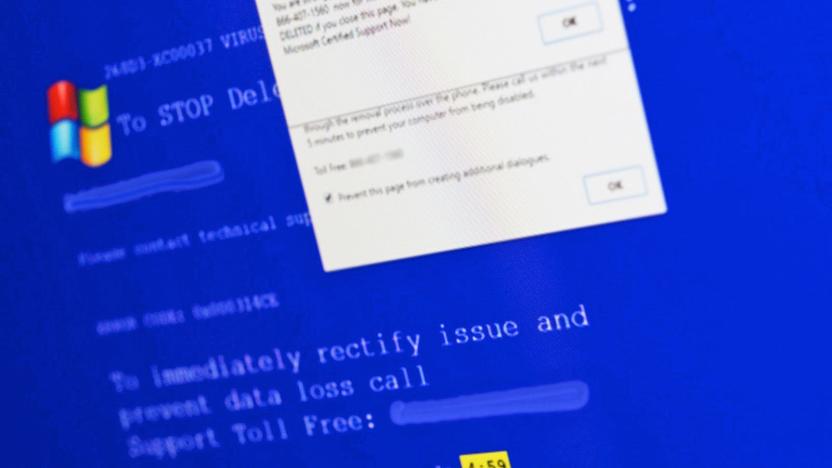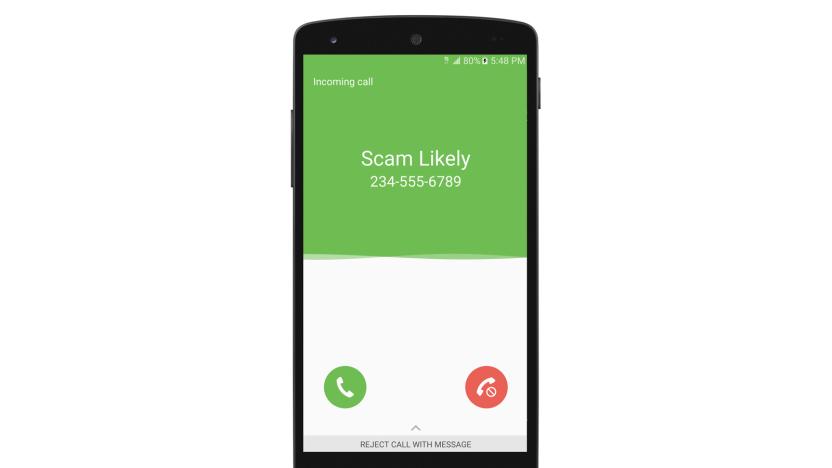scams
Latest

After Math: Life imitating art imitating life
Between the political theater and unreal earnings reports, this has been a surreal week for the ages. But while you were glued to the news feeds, an AI-generated art piece sold for silly money, NASA fixed the Hubble by jiggling its handle and a band of clever thieves perpetrated a multimillion-download ad scam that would put the Ocean's crew to shame.

Making a living scamming the scammers
"Well, my grandchildren were over and it's something about a pornography virus," says the soft voice of an elderly woman over the phone. "I unplugged my computer right away," she continues, and after she explains her worries in a little more detail, a female voice on the other end of the line replies, "That's all right. Don't worry, let me assist you with this. And may I know, is that a desktop or a laptop?" The PC has apparently been hacked, as confirmed by allowing the support team remote access, but resolving this comes at a cost. Nearly two hours and 20 minutes -- and several transfers between call center staff -- later, Kitboga drops the vulnerable-old-lady act.

Most White House email domains could be vulnerable to phishing
We can likely all agree that governmental cyber security is an important issue. While the Attorney General has created a task force to deal with election hacking, there have been plenty of digital security fails in the past year. And the FCC doesn't seem to care too much about data privacy, either. Now, according to a report from security firm Global Cyber Alliance (GCA), more than 95 percent of the email domains managed by the Executive Office of the President (EOP) — including WhiteHouse.gov — could be used in a phishing attack due to lax security protocol.

T-Mobile fights phone scams with new tools for customers
This week, the FCC revealed its plan to battle robocalls. Part of that initiative includes allowing phone companies to target and block calls from fake or suspect phone numbers. Those rules are still being finalized, but T-Mobile isn't wasting any time on the matter. Today, the Uncarrier began rolling out two tools to its customers to help with phone scams: Scam ID and Scam Block.

EU orders Facebook and Google to prevent consumer scams
Social media platforms are still a wild, wild west of consumer fraud, with uncountable numbers of scams everywhere. The EU has ordered Facebook, Google and Twitter to put a stop to them or risk facing "enforcement action." It's demanding that the social media companies find a way to spot and remove such listings as soon as they're aware of them and create direct communication lines with watchdogs to discover wrongdoing.

Vodafone now blocks unwanted calls before they reach you
Nuisance callers are having a tough time of it already this year, with Ofcom banning them from withholding numbers and helping to create a simple, text registration option for the UK's leave-me-alone database. But Vodafone's decided to go even further, today announcing that it has begun blocking unwanted calls at the network level, so they don't even reach your phone in the first place.

How to avoid the tech support search engine trap
Recently, a friend of mine was having troubles with his Epson scanner. He Googled Epson tech support and wound up talking to a technician who logged into his Mac and claimed to find viruses that were affecting the scanner's performance. He offered to fix the problems on the spot for US$200. My friend didn't call me in time, becoming a victim of search engine ranking that can give top search billing to firms that are often not what they appear to be -- in this case, Epson's tech support team -- and more often, simply con men. Ultimately, my friend's problem was misconfigured software. He shouldn't have let someone log into his Mac, but he thought -- mistakenly -- that he was talking to Epson. It's a common problem. Even doing a Google search on iPhone tech support gave me three non-Apple firms as results. Yes, most of us look at the web address of the link, but many people don't, and that makes this kind of scam profitable. And sure, there are third-party technicians who show up in the results and are often members of the Apple Consultants Network who could provide top-notch support. But many people have no idea who is genuine or bogus until it's too late. It's not just Google. I ran the same search on Bing and got similar results. While Google at least highlights the third parties as ads, Bing's page layout doesn't exactly make it easy to see what are ads and what are real search results. In fact, Epson's support page was the fifth item on the list of Bing results. I had a similar experience while trying to book hotel reservations. I wanted a room with a national chain, and the top search result looked legitimate. It wasn't, and all kinds of fees were added to what should have been an inexpensive set of rooms. I cancelled, booked with the chain directly, and saved $175.00. Many of our readers know this, but others do not. Search engines are in business to make money, and search results can be skewed by companies paying search providers for featured listings. If you need tech support for your devices, be sure to contact the manufacturer directly. And if you need local hands-on help, look for providers who are certified by a manufacturer. You'll often see the same misleading search results when looking for manuals and instructions. There are third parties that lead the search engines links, but then they want your email address for who knows what purpose, or you may be asked to pay for something you can download directly for free. Almost every manufacturer makes up-to-date manuals and instruction sheets available at no cost, so don't fall for scams that charge a fee for what could be outdated information. Both Google and Bing will show you the web addresses on your search. If a given result doesn't appear to be pointed to an actual manufacturer's web site, look for the proper link to save yourself frustration and potentially some money. If you have had similar experiences, be sure to share them with our readers. For more information about how web search works, there is a solid academic paper at the Stanford University website. And yes, I found it using Google.

Watch out for Warlords of Draenor phishing scams
With another expansion looming on the horizon, there's another round of phishing scams and emails designed to trick you into giving up your account information. With this kind of scam, you get an email or visit a website that's so much like Blizzard's that you wind up typing in your login information, which the scammers then use to pick your account clean. Though you may think this is the sort of thing people only fall pray to when they aren't paying attention, phishing scams get more sophisticated -- and harder to recognize -- every day, so you need to keep your guard up. Take this Warlords of Draenor phishing scam reported by Malwarebytes as an example. It starts off with an email that's formatted like a message from Blizzard saying you've won a free copy of Warlords -- which is really where you should get suspicious. Once you click on the link in the email, you're sent to a perfect copy of the Battle.net login screen where you're asked to enter your login information as well as your secret question and answer before you can redeem your free copy... but of course the scammers just run off with your info without giving you a thing. To avoid being had, always check the header to see where an email has come from -- Blizzard emails will only come from an @blizzard.com address -- and if an offer sounds too good to be true, contact Blizzard directly to ask about it. For more tips on avoiding phishing, check out the support page on phishing scams.

A friendly reminder of the benefits of Apple's walled garden
The debate over which app marketplace model is best -- Apple's "walled garden" or Google's much more open approach -- will likely never be settled. For developers who favor the Play Store, the ability to immediately iterate on their apps and fix bugs without delay is fantastic, while App Store devotees quickly point out the value of having a more rigid screening process in place. If you're in the App Store camp, you can add an arrow to your quiver thanks to an Android app called Virus Shield. The app, which sold for a pricey US$3.99, rocketed to the top of the Play Store's paid apps chart thanks to its claimed ability to keep Android devices free of malware. The app's "features" included the ability to scan files and media on an Android device in real time, alerting the owner of any suspicious activity while at the same time preventing future attacks. All told, over 10,000 people paid the premium for the app's services, giving it a shining 4.7/5 rating. Unfortunately, it was all a scam: Virus Shield did nothing to protect any device and its entire feature list was false. The app quite literally ran a fake "scan" and then produced a check mark after it was done, assuring the user that no malware was present. The good people of Android Police were the first to actually dig into the guts of the popular app and discover that it had absolutely no utility function whatsoever. The app has since been pulled from the marketplace, but attempts to track down its creator -- the one who raked in tens of thousands of dollar off of an app that did absolutely nothing -- have been fruitless. Google's just-announced on-device monitoring of apps is a nice step towards weeding out existing scams, but if it can't prevent shoppers from downloading (and paying for) the apps ahead of time, its ability to limit situations such as this is questionable. So while Apple's App Store review process isn't perfect, and can put a damper on the quick turnaround offered by more open alternatives, you can be confident that this type of thing wouldn't happen inside the walled garden. Sure, developers might sneak a Super Nintendo emulator onto Apple's shelves every once in a while, but I'm OK with that. Note: To be fair, there are plenty of shady apps on the App Store as well, and I've written about many of them. This one, however, is a particularly shameless cash grab that does literally nothing it claims to do, which is something the App Store review process would almost certainly weed out. [via Android Police]

The easiest way to get popular on the App Store
A good title is gold on the App Store. Along with the app's icon, the title is the first thing you notice about an app when it appears on your iPhone screen. Ever since Apple's decision to remove the "recently added" apps list, the title of a game is the single easiest way to find it in the App Store, but what if nobody is actually searching for your app? What can you do? Well, if you're willing to set your self respect aside, you can simply steal the name of successful apps. This is RedCross Rescue, or at least that was its title when MobileX Labs released it in November of 2012. But after a few months of poor sales, its name was changed to "Bike Race HD" in January 2013. It gained some traction, breaking the top 250 in the Adventure category, but it began to slip once more. Then, just last month, its fortunes miraculously shifted, climbing almost 750 spots from its 1,000+ ranking in Adventure to the top 300. But this amazing change of fortune wasn't due to a new update, cool level pack, or added functionality. No, it was achieved with nothing more than a simple name change. Overnight, Bike Race HD became "Bike Race Ninja Clumsy Run HD." Capitalizing on the absolutely scorching hot search term "Clumsy Ninja," the app did quite well, but its transformation wasn't complete. On February 14, a simple new app called "Le Pupppy" took the App Store by storm, becoming a top 10 game shortly after launch. And wouldn't you know it, as soon as Le Pupppy began its climb to the top, the app formerly known as RedCross Rescue evolved once again, this time to "Le Puppy Clumsy Biker Pupppy Race Ninja 2 HD." These are the current App Store search results for "Le Pupppy": And here are the results on the app's ranking after each name change in both the Adventure and Arcade game categories: The app is now more popular than it's ever been, and is once again cracking the top 250 in the Adventure category. This is an app that was published in August of 2013 with the title "Dumb Ways to Die 2 Day Saga Despicable Pet Rescue 2k14." No smoke an mirrors on this one; it was gaming the App Store's search feature from the very start. The game has only a passing similarity to the actual Dumb Ways to Die app, and MobileX Labs has no affiliation with the creators of the original whatsoever. Just days after being published, the app got an update that changed its title to sneak one more important keyword in, "Pou." The app's new title became "Dumb Ways to Die 2 Day Saga Pou Pet Rescue." And wouldn't you know it, less than a month after that name change, the app suddenly skyrocketed in popularity. But wait, there's more! After the Flappy Bird clone "Flying Circus - Wrecking Ball" became a hit just a few days ago, the app's name changed once more, this time to "Dumb Ways to Die 2 Day Saga Flying Circus," and gained another healthy bump in ranking, bringing it higher on the App Store charts than it has ever been -- and even cracking the top 1,000 overall US app chart for the first time ever. This is all thanks to the success of apps with which the publisher has no affiliation. This app in particular shows how a publisher can hitch its own app onto a successful name and ride its ups and downs. Here is a comparison of the overall US ranking of Dumb Ways to Die (in blue) and the clone's ranking on the US Adventure chart (in red): Instaliker, published by Top Free Apps And Games -- one of the App Store names MobileX Labs publishes under -- has had a particularly robust history of name swaps: Instaliker - 1000's of Likes & Followers Plus Instalikes Wow Gram Tool (launch title) Instaliker - 1000's of Likes & Followers Plus Instalikes Wow Gram Wowlikes Tool (added the term "Wowlikes," another popular Instagram utility) Instaliker - 1000 Instagram Likes & Followers Plus 1000likes Wow Gram Wowlikes Tool (added "Instagram", added "1000likes" which is yet another Instagram app, removed "Instalikes") Instaliker - 1000 Instagram Likes & Followers LaterSnap Plus 1000likes Wow Gram Wowlikes Tool (added "LaterSnap," another popular Instagram app) Instaliker - 1000 Instagram Likes & Followers Followliker Plus 1000likes Wow Gram Wowlikes Tool (current name, replaced "LaterSnap" with "Followliker," because LaterSnap changed its name) And WakaVille, officially titled "WakaVille USA Zombie Plague Pandemic Bitstrips," has nothing to do with the popular apps Plague Inc. or Bitstrips, but it's certainly benefitting from such a carefully crafted name. MobileX Labs MobileX Labs is the name you'll see linked to all these apps. The Chicago-based startup bills itself as an app creation solution for people who don't want to bother with coding. The company -- which has Mark Cuban as an advisor, and appears on Cuban's website -- also offers to build from-scratch apps for its clients. MobileX Labs publishes some of the apps itself, apparently under a number of App Store names, and if the app makes money, 20% of the profit goes to MobileX. As the company website states, MobileX is the one that cuts the check for the remaining 80% to the client. I wanted to get a better feel for who was behind the App Store naming "tweaks," so, mentioning the Dumb Ways to Die app specifically, I emailed the official support contact listed on the MobileX Labs website. I received this in response: We published this game for a client last year and we own the source code of the game, and we don't have any affiliation with Metro Trains Melbourne, the purveyors of Dumb Ways to Die. We have not had any pushback from Apple or the MTM people on the title, so we assume this is within the guidelines of app naming. We don't really focus on simple games like this any more but we agree with the client to leave the game up as it does generate revenue. In a followup email, I was told any information I had received -- this is from the official support email, remember -- was "off the record." When I didn't agree to this, I was told I could not longer be helped. I also emailed MobileX Labs CEO Daniel Novaes in an attempt to get an actual answer, and was told that apps for clients are named according to the client's wishes -- and to be fair, there are quite a few MobileX Labs apps on the store that were clearly made by well-meaning clients -- but games MobileX made may have been "outsourced to marketing firms/freelancers." Novaes also noted that MobileX hasn't had anything to do with RedCross Rescue (or its subsequent name changes) "for nearly a year," claiming that his company simply hosts the app and gives its new owner access to it through iTunes. He also said that WakaVille was named by a separate "app marketing service." This adds another layer to things, but doesn't change the fact that MobileX is either willfully ignorant of the fact that it's supporting an extremely gross business practice, or doesn't care. So does gaming the App Store pay off? In an October interview, Novaes notes that MobileX Labs rakes in roughly $100,000 a month. With how many clients the company has, there's no way to tell how much of that is thanks to shady App Store naming. It's worth noting that of all the apps published under the company's name, the most popular are indeed the same apps that appear to be using titles of other, legitimately popular apps. So there you have it, aspiring app developers; Popularity is as simple as blatantly ripping off the name of your competitors and turning a blind eye to ethics. [All ranking data by App Annie]

MMO Mechanics: Balancing game economies
Most players won't need an economics degree to play an MMO, but strong mechanical forces under the bonnet still guide our actions in our favourite titles. Virtually every financial exchange can be broken down into an effort equals economic gain equation: We put in our hours, and the game economy churns out new gear or money. Since so many in-game actions financially reward players, MMOs have developed mechanics that attempt to curtail the inflation game economies usually see. Charging your character for goods and services, bind-on-pickup gear, regular destruction of valuable goods, and player-controlled auction house and farming systems all combine to keep the spiralling amount of coppers falling into player hands in check. In this week's MMO Mechanics, I'm going to look at some ways both sandbox and themepark MMOs automatically rebalance weighted economies by exploring the systems that restrict the free trade of goods and curb players' constant accrual of money. I'll look at how each system functions and how player manipulation adds a new layer of realism to game economies.

The strange, shady world of $1,000 iOS apps
The Fleas is an iOS action game that tasks you with dispatching pests as they make their home on the back of your furry friend. It's interesting for two reasons: First, it has a retro art style the harkens back to the early days of cinema. The second reason is that it's priced at US$999.99. The app was created by Vhlamlab, which, as far as I can tell, is comprised of a single person. His name is Sergiy Grachov and he lives in Cuba. I tracked Grachov down purely out of curiosity's sake, but what he shared with me shows that despite Apple reportedly tweaking its App Store algorithms, it's still entirely possible to game the marketplace for profit. To be clear, Grachov emphasized that he has never engaged in these scam techniques himself, but he has seen them utilized firsthand. It all begins with an otherwise unremarkable app suddenly skyrocketing in price, oftentimes all the way to the App Store's limit of $999.99. The developer, or whoever is orchestrating the scam, wires a massive amount of money -- Grachov used $10,000 as an example -- to a second party. That individual then purchases 10 copies of the app, exhausting the available funds and indirectly paying $7,000 of the original deposit back to the developer. Apple takes its 30% as usual. The App Store sees $10,000 worth of money changing hands over the app and, as Grachov says, "like magic" the app appears on the Top Paid apps list. (Note: It's more likely that this trick would land you on the Top Grossing list, rather than Top Paid.) How close do you get to the no. 1 spot, for what is essentially a $3,000 App Store bribe? Anywhere from no. 18 to no. 13, according to Grachov. Once the app has reached its highest point, the developer drops the price back to the one- to two-dollar range, and it gets at least a few hours of top-app sales before disappearing back into the ether. Whether the $3,000 investment is worth the eventual payoff depends on its performance during this relatively small window. So why is The Fleas priced so high, if not to benefit from a shady pricing scheme? The app has seen a huge range of price changes, from free to $0.99, to $99, to $299, and of course all the way to $999. Grachov says the price will now remain at $999 forever due to the fact that, believe it or not, people have actually bought it at that price. Apple's App Store algorithm changed a bit in 2013 in an effort to weed out low-rated apps on the top app charts, but it definitely hasn't been a universal fix. There are currently 10 apps on the top 200 paid list that are rated 2.5 stars or less, and there's even a one-star rated game hanging around. Apple's effort against App Store scams is shrouded in secrecy, just like everything else the company does behind the scenes, so there's really no way of knowing if the company has an answer for a paid app trick like this. Strangely, we are left to rely on the word of those who report that the world of gaming the App Store is still alive and kicking.

MMO Mechanics: Three fair ways to distribute loot
I mentioned last week that players throw their precious characters into the MMO meat grinder in the pursuit of higher levels, new achievements, or shinier gear. We gladly jump on the seemingly endless PvE treadmill, cranking up the speed with each new patch in an attempt to catch the dangling carrot of character perfection. Of course, we don't just punish ourselves like this to say we overcame some previously impossible challenge; there's shiny new loot to be had! The best booty usually comes from completing group activities like dungeons and raids, but not everyone can agree on how to share the spoils of joint pursuits. Several different loot distribution methods have been devised over the years to solve the problem of fairly distributing the swag, with most methods starting life as player-made agreements that weren't officially supported by hard-coded game mechanics. Players have long since rolled for gear or took turns to claim items round-robin style, leading developers to implement the most popular methods as actual game mechanics to avoid ninja-looting and then the inevitable public pity parties associated with player-led arbitration. In this edition of MMO Mechanics, I'll break down three of the most equitable loot distribution systems used in MMOs today and look at why this age-old problem doesn't have a one-size-fits-all solution.

Microsoft will pay foolish people $200 to ditch their iPad, but you should know better
When a device has cornered a market as well as Apple's iPad line has, the competition will do a lot in an attempt to close the gap, and too-good-to-be-true trade-in programs are not unheard of. Microsoft has launched a promotion in the hopes of getting iPad users to ditch their tablets in favor of the company's own Surface, but rather than too-good-to-be-true, this "deal" falls into the category of I-can't-believe-they're-serious. Accompanied by an ad that reads "It pays to trade in your old iPad," Microsoft is tweeting that it will pay you a minimum of US$200 in store credit to trade in your second-, third- or fourth-generation iPad and buy a Surface instead. Two. Hundred. Dollars. Aside from the fact that the deal doesn't include the first-generation iPad -- which, logically, would be the device most likely to warrant replacement -- to offer a mere $200 for even the lowliest of the qualifying devices (a 16GB iPad 2 w/WiFi) is a bit ridiculous. That particular model fetches closer to $300 than $200 on eBay, even in "decent" used condition. After contacting several Microsoft Stores to get a better handle on how high their offers go, I was told prices can only be offered once you're actually in the store itself. Seriously, if you have your heart set on a new Windows tablet, at least don't fall for this predatory ploy. You can get much more for your current hardware by putting in a bare minimum of legwork.

Behind the scenes as a [REDACTED] Game Master
Once upon a time, I worked as a game master for a very popular MMORPG. My duties were relatively simple: help players out of sticky situations and enforce the rules of the game when it came to cheating, harassment, and general player behavior. A game master's role is to protect the player from any and all potential game dangers, up to and including the player himself. In my work as a GM, I saw many amazing things. I saw guild members contact support staff because they were worried about another player's real-life wellbeing. I saw incredibly complex scams across multiple players and accounts that, while infuriating and exceptionally against the rules, were astonishing in their genius. And of course, I saw lots and lots of cybering.

Officers' Quarters: Defeating the needies
Every Monday, Scott Andrews contributes Officers' Quarters, a column about the ins and outs of guild leadership. He is the author of The Guild Leader's Handbook. We've all been there. You invite new people to your guild. They seem like they'll be a great addition to the roster. They ask for help and you gladly offer it. They ask for more and you give more. Then they promptly ride off into the sunset. This week, an officer wants to know how to avoid being the victim of these players. Hi Scott We're a friendly, mainly social guild with helpful officers and roster. We occassionaly meet some seemingly cool, nice people that I or the officers warm up to immediately, chatting in vent, etc. They might jump right in to be active in guild chat, and otherwise give every indication that they are mature, responsible and ethical. Every now and then I guess I'm too trusting, and extend help to some of these people in the form of time, guild bank items, and even gold, and then I log in and see they've left the guild without so much as a thank you. Mind you, some of these people have accepted some rather expensive help from us. So I've decided that no matter how nice you seem, or how much any of us may like you or know you, you will have to have been in the guild a certain amount of time before getting any bank items or money, etc. say, over a certain value maybe. I'm just not sure what the specifics on this rule should be, or what else we should do to protect ourselves from these kinds of people. Any advice would be appreciated. Thanks, pj

Fake installer malware makes its way to Mac
If you download a Mac app and its installer asks you for your phone number, you're likely looking at the latest malware to find its way onto OS X. According to Russian security firm Dr. Web, a Trojan malware has been identified called Trojan.SMSSend.3666 that requests your mobile phone number in exchange for a promised activation code, but actually initiates automatic charges to your account should you be gullible enough to go along with it. These Trojans can be attached to legitimate applications that would otherwise be available without the need for SMS-based activation, the site points out, or even to junk programs that do nothing at all. They're nothing new to Windows and Android users, but this is the first time that such malware has been identified on Mac. Needless to say, if you find yourself presented with a request like this, you should exit the installer immediately. If you're trying to install an app you know to be legitimate, make sure you're downloading it from the developer's official site. [Via The Next Web]

FTC offers $50,000 prize for stopping illegal robocalls, we could have used this a few months ago
Robocalling is considered a plague in the modern phone world, especially during an election year -- and while you likely won't get rid of all the pitches from political candidates anytime soon, most of the commercial calls are outright illegal. The Federal Trade Commission has devised a unique contest to help cut back on those law-breakers without having to chase down every shady debt relief offer. It's offering a $50,000 reward for the cleverest solution to blocking the banned variety of robocalls. The only requirement is that you be an adult US resident: if you can invent a surefire remedy in your basement, the FTC wants to hear from you. Entries will be open between October 25th and January 17th, with word of a winner around April 1st. We're hoping that the champion has a truly effective cure in use before long, because we'll undoubtedly have reached our breaking point on robocalls by... oh, around November 6th. [Image credit: SarahNW, Flickr]

McAfee shows how major Android scamware ticks, prevents us from learning first-hand
Most Android malware lives in the margins, away from Google Play and the more reliable app shops. It's nonetheless a good idea to be on the lookout for rogue code, and McAfee has stepped in with thorough explanations of how one of the most common scamware strains, Android.FakeInstaller, works its sinister ways. The bait is typically a search-optimized fake app market or website; the apps themselves not only present a legitimate-looking front but include dynamic code to stymie any reverse engineering. Woe be to anyone who's tricked long enough to finish the installation, as the malware often sends text messages to expensive premium phone numbers or links target devices to botnets. The safeguard? McAfee would like you to sign up for its antivirus suite, but you can also keep a good head on your shoulders -- stick to trustworthy shops and look for dodgy behavior before anything reaches your device.

EVE Evolved: Making your first billion ISK
A lot of the people I introduce to EVE Online ask about the possibility of playing for free by buying game time codes with in-game ISK. It's a legitimate way to turn EVE into a free-to-play game, but the rising price tag of a 30-day PLEX can make it seem as if only veteran players can afford to do it. New players typically scrape together just a few million ISK by the end of their free trial periods, making the 500 million per month required to pay via PLEX seem like a tall order. With the right guidance, a new player can actually pull in over a billion ISK in his first month or two of play and quickly become able to afford a PLEX each month. Farming missions requires a bit of time investment but can pull in 20-30 million ISK per hour once you're set up, and exploration and salvaging can lead to some unexpected big hauls. There are also plenty of newbie-friendly corps that run group activities, and those who aren't interested in grinding to their first billion ISK might try their hands at trading or turn to a life of crime. It's all possible in the sandbox. In this week's EVE Evolved, I give some practical tips on making your first billion ISK, from scraping together the seed capital to buy your first big ship to reliable farming methods and some more underhanded methods.









